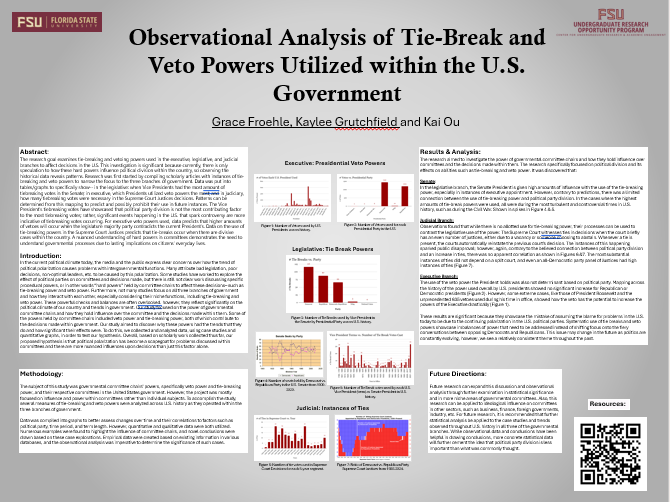Research Symposium
25th annual Undergraduate Research Symposium, April 1, 2025
Grace Froehle Poster Session 3: 1:45 pm - 2:45 pm/ Poster #85
BIO
My name is Grace, and I am from The Villages, Florida! I am a first-year student at FSU, studying Political Science and Criminology, and I am set to graduate in Spring 2026! I am very passionate about politics, law, and government and will attend law school to focus on international law in the fall of 2026. Research, especially in the UROP program, allows me to explore these various interests and fuels my enthusiasm for lifelong exploration and learning.
Observational Analysis of Tie-Break and Veto Powers Utilized within the U.S. Government
Authors: Grace Froehle, Kai OuStudent Major: Political Science and Criminology
Mentor: Kai Ou
Mentor's Department: Political Science Mentor's College: College of Social Science and Public Policy Co-Presenters:
Abstract
The research goal examines tie-breaking and vetoing powers used in the executive, legislative, and judicial branches to affect decisions in the U.S. This investigation is significant because currently, there is only speculation as to how these hard powers influence political division within the country, so observing the historical data reveals patterns. Research was first started by compiling scholarly articles with instances of tie-breaking and veto powers to narrow the focus to the three branches of government. Data was put into tables/graphs to specifically show-- in the legislative: when Vice Presidents had the most amount of tiebreaking votes in the Senate; in executive, which Presidents utilized veto powers the most; and in judiciary, how many tiebreaking votes were necessary in the Supreme Court Justices decisions. Patterns can be determined from this mapping to predict and possibly prohibit their use in future instances. The Vice President's tiebreaking votes have showcased that political party division is not the most contributing factor to the most tiebreaking votes; rather, significant events happening in the U.S. that spark controversy are more indicative of tiebreaking votes occurring. For executive veto powers used, data predicts that higher amounts of vetoes will occur when the legislature majority party contradicts the current President's. Data on the use of tie-breaking powers in the Supreme Court Justices predicts that tie-breaks occur when there are divisive cases within the country. A nuanced understanding of hard powers in committees demonstrates the need to understand governmental processes due to lasting implications on citizens' everyday lives.
Keywords: government, tie-break, veto

